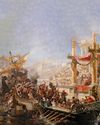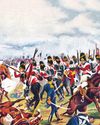
In the summer of 480 BCE, the Great King of Persia, Xerxes, led an immense army and fleet into Europe with the goal of conquering Greece. Fifteen years earlier the Athenians had played a minor part in the five-year revolt of his Greek subjects spread across the western fringe of his empire, and in 490 BCE they had added injury to insult at Marathon by comprehensively defeating a punitive expedition launched by Darius, Xerxes’ father. Darius had planned a second expedition in overwhelming force, but this was delayed by insurrection in Egypt and his death in 485 BCE. It was Xerxes’ duty as Darius’ successor to execute the plan.
In strategic terms, the conquest of mainland Greece and the islands and northern seaboard of the Aegean would stabilise the empire’s western frontier. Then, as ‘Great King, King of Kings, Ruler of the Lands’, Xerxes or his successors might have turned their thoughts beyond Greece to Sicily and Italy. More would then be at stake even than Greece’s future and the golden age of classical civilisation.
Herodotus, our foremost source for these critical years, puts these words into Xerxes’ mouth in a speech to his council of leading Persians: “If we conquer the Athenians and their neighbours, we shall extend the territory of Persia to the very edge of the earth, even where it joins with God’s heaven. When I have passed through Europe, there will be no lands under the sun that lie outside our borders, because I will make all lands one land.” The speech is invented, but it plausibly represents Xerxes’ vision and sense of destiny.
Denne historien er fra Issue 104, 2022-utgaven av History of War.
Start din 7-dagers gratis prøveperiode på Magzter GOLD for å få tilgang til tusenvis av utvalgte premiumhistorier og 9000+ magasiner og aviser.
Allerede abonnent ? Logg på
Denne historien er fra Issue 104, 2022-utgaven av History of War.
Start din 7-dagers gratis prøveperiode på Magzter GOLD for å få tilgang til tusenvis av utvalgte premiumhistorier og 9000+ magasiner og aviser.
Allerede abonnent? Logg på

NAUMACHIA TRUTH BEHIND ROME'S GLADIATOR SEA BATTLES
In their quest for evermore novel and bloody entertainment, the Romans staged enormous naval fights on artificial lakes

OPERATION MANNA
In late April 1945, millions of Dutch civilians were starving as Nazi retribution for the failed Operation Market Garden cut off supplies. eet as In response, Allied bombers launched a risky mission to air-drop food

GASSING HITLER
Just a month before the end of WWI, the future Fuhrer was blinded by a British shell and invalided away from the frontline. Over a century later, has the artillery brigade that launched the fateful attack finally been identified?

SALAMANCA
After years of largely defensive campaigning, Lieutenant General Arthur Wellesley went on the offensive against a French invasion of Andalusia

HUMBERT 'ROCKY'VERSACE
Early in the Vietnam War, a dedicated US Special Forces officer defied his merciless Viet Cong captors and inspired his fellow POWs to survive

LEYTE 1944 SINKING THE RISING SUN
One of the more difficult island campaigns in WWII's Pacific Theatre saw a brutal months-long fight that exhausted Japan’s military strength

MAD DAWN
How technology transformed strategic thinking and military doctrine from the Cold War to the current day

BRUSHES WITH ARMAGEDDON
Humanity came close to self-annihilation with the Cuban Missile Crisis, Broken Arrows’ and other nuclear near misses

THE DEADLY RACE
How the road to peace led to an arms contest between the USA and USSR, with prototypes, proliferation and the world’s biggest bomb

THE MANHATTAN PROJECT
Einstein, Oppenheimer and the race to beat Hitler to the bomb. How a science project in the desert helped win a war